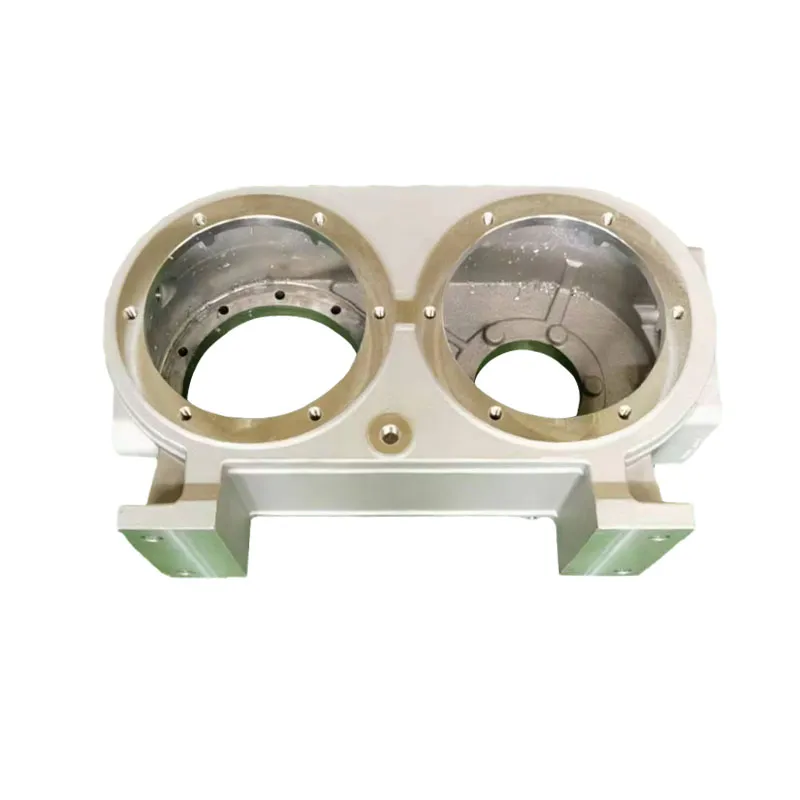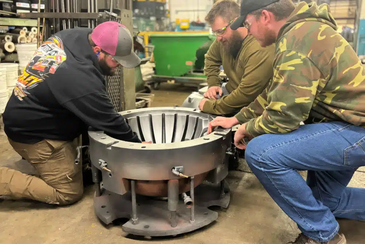Aluminum Casting Company solutions for large-scale manufacturing projects
Wiki Article
How Aluminum Foundries Add To Different Industries: A Thorough Summary
Light weight aluminum foundries function as essential providers across several industries, including auto, aerospace, building, and electronics. They generate parts that are not just light-weight however likewise sturdy, boosting the efficiency of numerous items. With advanced spreading strategies and a dedication to sustainability, these shops are adapting to satisfy advancing sector needs. As they introduce, the effect of aluminum spreadings on different applications raises essential inquiries regarding the future of manufacturing. What exists in advance for this vital industry?The Duty of Aluminum Foundries in the Automotive Market
As the auto industry progressively embraces lightweight products to boost fuel effectiveness and efficiency, aluminum shops play a critical duty in this evolution. These centers focus on the production of light weight aluminum spreadings, which are essential components in modern-day lorries. By supplying high-strength, light-weight components, aluminum factories allow producers to decrease the total weight of cars, eventually leading to enhanced fuel economy and lowered exhausts.Aluminum's resistance to deterioration additionally boosts car durability, making it an eye-catching selection for automakers. Factories make use of innovative strategies such as die spreading and sand casting to produce intricate and specific parts, making sure that they meet rigorous industry criteria. Additionally, the capacity to recycle aluminum effectively adds to a more lasting production procedure. As the vehicle market remains to introduce, aluminum shops will certainly continue to be essential in providing the materials required for the following generation of automobiles, sustaining both performance and environmental goals.

Aerospace Applications of Aluminum Castings
Light weight aluminum spreadings are essential to the aerospace market, using a combination of lightweight strength and longevity that is important for airplane performance. These castings are used in different parts, such as engine components, structural structures, and landing gear, where weight reduction is vital for gas performance and general safety. The flexibility of aluminum permits complex geometries that improve wind resistant efficiency while keeping architectural integrity.In addition, innovations in casting modern technologies have enhanced the precision and surface finish of aluminum parts, reducing the need for extensive post-processing. This effectiveness not only speeds up production timelines yet likewise decreases prices, making aluminum an eye-catching choice for producers. The rust resistance of aluminum guarantees long life and dependability in rough operating settings, additionally establishing its role in aerospace applications. As the industry progresses, light weight aluminum castings remain to be an important product, driving innovation and sustaining the growth of next-generation aircraft.
Building And Construction Industry Developments With Aluminum
The building industry has actually significantly embraced aluminum because of its lightweight residential properties and versatility, paralleling its successful applications in aerospace. Advancements in light weight aluminum style have led to stronger, more efficient structures, enabling contractors and designers to explore new possibilities. The product's resistance to rust and low upkeep requires make it especially appealing for both commercial and domestic tasks.Light weight aluminum's convenience assists in the production of elaborate layouts, enabling for aesthetic improvements that were formerly difficult with typical materials. Prefabrication methods have also progressed, making use of aluminum to minimize building and construction time and prices considerably. In addition, the energy performance of light weight aluminum systems-- such as window structures and roofing-- contributes to lasting structure practices, aligning with modern-day environmental standards. As the building sector remains to accept these developments, aluminum's function is anticipated to expand, driving further technology and adding to the advancement of durable frameworks.
Electronics and the Need for Lightweight Light Weight Aluminum Parts
With the quick innovation of innovation, the demand for light-weight aluminum parts in the electronic devices field has surged. As devices come to be much more mobile and small, manufacturers seek materials that supply both longevity and weight decrease. Aluminum, with its excellent strength-to-weight ratio, has become a favored option for parts such as housings, warm sinks, and structural assistances.Using light weight aluminum not just improves product efficiency but likewise adds to power performance, as lighter devices require less power throughout operation. Furthermore, aluminum's superb conductivity makes it perfect for digital applications, making certain effective warm dissipation and reducing the risk of getting too hot.
As consumer preferences shift in the direction of streamlined and lightweight devices, aluminum foundries play a crucial role in satisfying the evolving needs of the electronic devices industry (Aluminum Casting Company). Their capability to create exact and high-grade light weight aluminum elements sustains advancement, allowing suppliers to press the limits of style and performance
Lasting Practices in Light Weight Aluminum Foundries
As the electronic devices market significantly focuses on sustainability, aluminum shops are adapting their methods to align with these environmental objectives. Lots of foundries are implementing reusing programs that redeem aluminum scrap, substantially lowering the demand for raw products and decreasing waste. By making here use of energy-efficient technologies, these centers are decreasing their carbon footprint; as an example, employing electrical heaters instead of standard gas-fired ones can result in significant energy cost savings.Furthermore, light weight aluminum foundries are buying water conservation procedures, such as closed-loop systems that recycle water used in cooling down processes. These methods not just lower water intake however additionally minimize the environmental impact associated with wastewater discharge. Furthermore, several foundries are discovering renewable resource sources, such as solar and wind power, to satisfy their power needs sustainably. Through these initiatives, aluminum shops exemplify a commitment to environmental stewardship while remaining to satisfy the needs of the electronic devices sector.
Future Trends in Light Weight Aluminum Factory Technologies
Arising innovations are positioned to change aluminum foundries, enhancing performance and item top quality while progressing sustainability efforts. Technologies such as artificial knowledge and artificial intelligence are anticipated to maximize production procedures by predicting devices failings and enhancing resource appropriation. The combination of sophisticated robotics will certainly simplify procedures, lowering labor expenses and reducing human error.Additive production, or 3D printing, is likewise obtaining traction, allowing the production of complex geometries that were formerly unattainable with traditional methods. This shift might bring about considerable product financial savings and reduced waste. Additionally, clever foundries utilizing IoT (Web of Points) modern technologies will allow real-time monitoring and data evaluation, fostering proactive decision-making.
The adoption of cleaner melting innovations and reusing techniques will certainly even more decrease the ecological impact of light weight aluminum foundries, making them a lot more lasting. Collectively, these patterns signal a future where light weight aluminum factories can run with better performance and duty.
Regularly Asked Inquiries
What Are the Ecological Influences of Aluminum Foundries?

Exactly How Do Foundries Make Sure Quality Assurance in Light Weight Aluminum Casting?
Foundries guarantee high quality control in aluminum spreading by executing extensive assessment procedures, making use of innovative technology, conducting routine material screening, and adhering to industry criteria, consequently keeping consistency and integrity in their ended up products. Precision aluminum casting.What Is the Typical Lifespan of Aluminum Cast Parts?
The average life expectancy of light weight aluminum cast components usually ranges from 10 to 50 years, relying on elements such as ecological conditions, use, and maintenance. Appropriate care can substantially improve their toughness and efficiency gradually.Just How Are Light Weight Aluminum Alloys Selected for Certain Applications?
Aluminum alloys are selected based on elements such as strength, deterioration resistance, weight, and thermal conductivity. Engineers examine the certain needs of applications to determine one of the most suitable alloy for best performance and sturdiness.What Are the Safety Laws for Light Weight Aluminum Shop Workers?
Safety and security policies for light weight aluminum shop workers consist of personal protective equipment requireds, air flow demands, direct exposure limitations to harmful products, and protocols for managing liquified metal. Conformity warranties employee security and decreases wellness dangers connected with factory operations.As the automotive industry increasingly embraces lightweight materials to boost gas performance and efficiency, light weight aluminum shops play an essential duty in this development. As consumer preferences shift in the direction of sleek and light-weight gizmos, light weight aluminum foundries play a crucial function in fulfilling the advancing demands of the electronic devices industry. As the electronics market progressively focuses on sustainability, aluminum shops are adjusting their practices to align with these ecological objectives. Several foundries are applying recycling programs that redeem light weight aluminum scrap, substantially minimizing the need for raw materials and decreasing waste. Safety and security guidelines for light weight aluminum foundry workers consist of personal protective devices mandates, air flow needs, direct exposure restrictions to harmful materials, and methods for taking care of liquified metal.
Report this wiki page